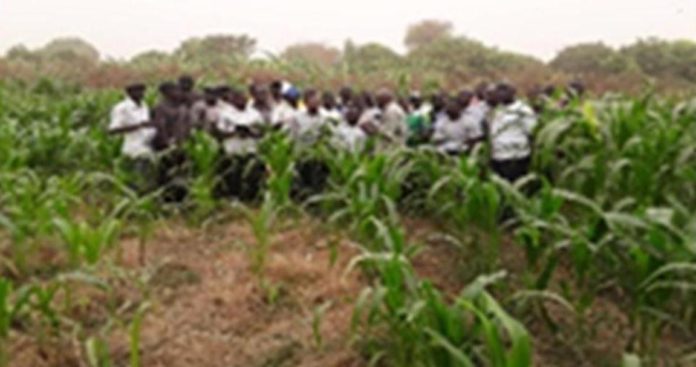BY: LAMIN FATTY IN URR
As part of national efforts in mitigating the impacts of a notorious crop pest called Fall Army Worm FAW, the Ministry of Agriculture in collaboration with the Food and Agriculture Organisation, FAO, recently concluded a series of intensive capacity building training for over seventy extension workers from CRR, LRR and URR. The event was held at the Regional Education Directorate in Basse. The training included field visits to a dry season maize farm in Kumbija, already intruded by the pest, so as to empower the Extension Officers and farmers, to be able to identify the egg mass and larvae of this worm.
Speaking to this reporter Dr. Faye Manneh of the National Agricural Research Institute (NARI), said the FAO in collaboration with NARI and Department of Agriculture (DOA), under the auspices of the Plant Protection Services (PPS), organized the training which was coordinated by him; that the objectives of the training among others is to reinforce the knowledge and skills of extension officers, to serve as frontline agents in empowering farmers to know the biology and some of the control strategies in order to bring down the infestation of the fall army worm below the economic threshold; that it was in August 2017 when the country realized the invasion of the fall Army worm in 3 different locations namely Kembujeh, Radville Farm and Bakau women’s garden. In September he said the ministry embarked on a country wide surveillance and in just two months he said it was seen across the country in all the regions and the infestation according to him was so high especially in west coast, that they could not imagine it will reach at that level. This year, he said they embarked on another dry season surveillance on dry season maize and found the insects again, in all the regions. He pointed out that because is seen everywhere in the Gambia, tells Agriculture that the insect is here to stay and the population is expected to increase and this will affect the coming farming season.
He said since they don’t know more about the insects because is new, the way forward as a first step is to conduct sensitization for farmers to know about the insects. He said the second steps is to strategies how best to control this pest. He said NARI is currently conducting some experiments to know the best possible means to control the pest and they also intend to do impact assessment to know how much the insects can cause damage to our crops. He said according to research FAW can affect 3 different stages of the plants growth, the leaves severely at the vegetative stage which he said affects the level of photosynthesis and the flora part which is tassel also affects the pollinations, he said it grows into the crop itself and destroy the grains. He stated that according to literature in other countries, the pest is also capable of devastating or affecting over 80 different species of crop, meaning there is possibility of the pest attacking other crops beside maize or sorghum. He said eradication is impossible, but how best to use coping strategies such as early planting and intercropping cassava and maize to reduce the infestation and monitoring and scouting during the time of production period to see whether the egg is present or the larvae which will tell you the damage symptoms and therefore know that the need to do control measures, is important. He said he is impressed that the participants know the biology and can identify the insects and do control measures. He however challenges them to empower the farmers so as to bring down the population of the pest. He also called on all to know that this is a national concern and should be the work of every sector.
Ebrima James a Sierra Leonean national and a consultant said it is an honour for him to support the national strategy to control the worm in the Gambia. He said the basic information that the pest can affect a wide range of crops up to 80 different crops cause panic to farmers. He said NARI has undertaken a wide scale diagnostic survey in 2017 to indicate the level of infestation as a defector data but said that needs to be repeated using the standardized data collection tools to be used by all countries for inter change information’s. This pest, he said, is a threat to food security not only in the Gambia but the entire sub region. He challenges the extension workers to train farmers and conduct field visits through monitoring and scouting as some serious intervention strategies in addressing this pest.
Sana Giana senior agricultural officer in URR deputizing for the regional director of agriculture, said the training is important and timely because the pest is a threat to food security. He said according to research, the pest has potentials to fly up to 300 miles per night meaning is very active according to regional agriculture expert. He said it is threatening that the pest is present in URR around the ecologies in the dry season maize growing areas such as Sabi and Kumbija. The training he said will therefore enhance their knowledge and skills and strategies, to empower farmers to adapt control measures in mitigating the effects of the pest. He advized extension workers to share the information with farmers. Ajie Fatou Ceesay working at CRR North at Njaw Mix Farming Center also expressed similar sentiment, noting that the worm is devastating to crops. She said last year she did not know much about the pest but can now identify and use measures to control them. A farmer in Kumbija called on the Government and development partners to do all and join the fight against this notorious worm.
















